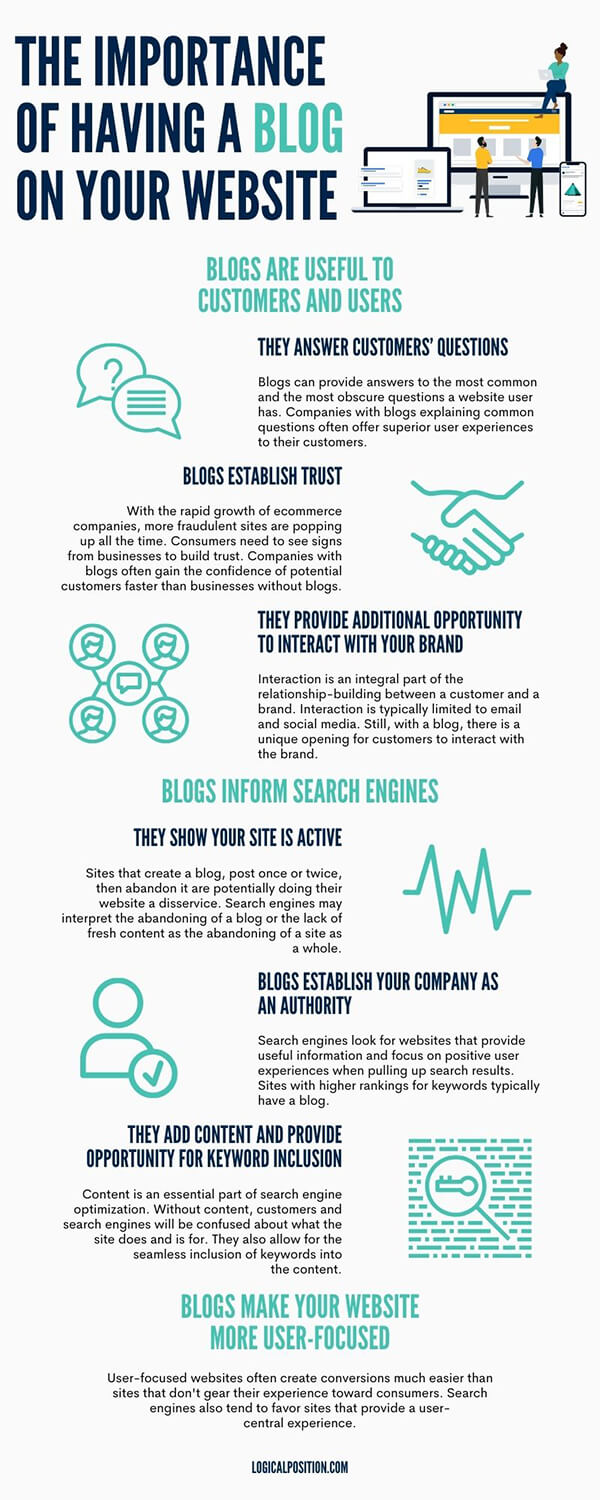Blogging isn’t just a trend or alternative to journaling. Blogging is a vital part of search engine optimization and online business health. Providing informational and relevant content to your company’s website is a great way to show people and search engines alike that the site is updated, informative, and useful. Discover the importance of having a blog on your website.
Blogs Are Useful To Customers and Users
Customers often visit a site for the first time to learn more information. More information could mean the customer is only looking for tips and tricks or researching a product they want to buy. Blogs can cover any information that is relevant to the site’s purpose. Blogs can be as creative as a company wants as long as they still relate in some way to the general intention of the site.
People enjoy quick, easy reads that give them more information about something that interests them. It’s a fun way to learn and provides entertainment. Discover the many ways blogs help users.
They Answer Customers’ Questions
Blogs can provide answers to the most common and the most obscure questions a website user has. Companies with blogs explaining common questions often offer superior user experiences to their customers.
Customers on sites with blogs don’t have to inquire to the company with their common questions and wait for a response. The information is immediate and easy to find on its own.
Blogs Establish Trust
Trust is something businesses must earn from customers; it’s not inherent. With the rapid growth of e-commerce companies, more fraudulent sites are popping up all the time. This saturation of scam sites creates an atmosphere of mistrust online.
Consumers need to see signs from businesses to build trust. Companies with blogs often gain the confidence of potential customers faster than businesses without blogs. Below are a few reasons for this occurrence.
- Scam sites don’t put enough effort in to keep up a blog.
- Blogs show recent activity from a website.
- Blogs provide information and establish the company as an authority on a subject.
- Blogs help gain the trust of search engines, which then lends confidence to consumers.
They Provide Additional Opportunity To Interact With Your Brand
Blogs provide additional opportunities for customers to interact with a brand. Interaction is an integral part of the relationship-building between a customer and a brand. Interaction is typically limited to email and social media. Still, with a blog, there is a unique opening for customers to interact with the brand.
Customers can read the blog and recognize that it is content put out by the brand, thus gather a better idea of the brand personality. They can also add comments, like posts or content, and share the posts, which is an ideal engagement that strengthens their emotional connection to the brand.
Blogs Inform Search Engines
Blogs are not just beneficial to users, but to search engines as well. Blogs work to add more content to a website. The more content a website has, the more search engine crawlers have to understand what the site is about. It’s crucial for search engines to understand the site to rise in the rankings for keywords relating to the site’s purpose.
They Show Your Site Is Active
Blogs tell a search engine that your website is regularly updated. Sites that create a blog, post once or twice, then abandon it are potentially doing their website a disservice. Search engines may interpret the abandoning of a blog or the lack of fresh content as the abandoning of a site as a whole.
Blogs that are updated regularly and post at least once a month show popular search engines, such as Google, that your website is relevant and up to date.
Blogs Establish Your Company as an Authority
Search engines look for websites that provide useful information and focus on positive user experiences when pulling up search results. Sites with higher rankings for keywords typically have a blog.
Blogs help to establish a website as an authority on specific subjects. Blogs on a website should be relevant to the website’s purpose. For example, an e-commerce site that sells clothing could write a blog titled, “Different ways to tie a scarf.” This blog is useful to people who want to discover new ways to tie a scarf and search engines looking for the best source for when someone searches for “ways to tie a scarf.”
They Add Content and Provide Opportunity for Keyword Inclusion
Blogs put additional content on a website. Content is an essential part of search engine optimization. Without content, customers and search engines will be confused about what the site does and is for.
Blogs provide a sensical place to implement new content on a website. They also allow for the seamless inclusion of keywords into the content. Companies need to use keywords that they want to rank for in search results on their website, and blogs are the perfect place to put them.
Blogs Make Your Website More User-Focused
User-focused websites often create conversions much easier than sites that don’t gear their experience toward consumers. Search engines also tend to favor sites that provide a user-central experience.
Blogs add to the user-friendliness of a website. They provide additional information for users and make finding the answers to questions much more effortless.
Well-written blogs can even provide a sense of entertainment and intrigue to the website and help keep users on the site for a longer time. The longer a person spends on a website, the better the chance for conversion.

Blogs provide businesses with many positive things. Blogs inform customers and search engines about what the company does and knows about. Blogs can answer frequently asked questions and even help people imagine incorporating your product into their lives. They even help search engines, such as Google, learn what your business does and start to trust the site as an authority on certain subjects, thus increasing the website’s organic rankings for specific keywords.
Logical Position is a local SEO agency that prioritizes growth while maintaining full transparency. We set clients up with a dedicated account manager for real transparency and frequent updates to their campaigns. Our clients enjoy quality blogs written by our professional SEO content writers and include keywords selected through expert analysts’ meticulous research. Contact Logical Position today for a free consultation and learn more about how our SEO packages could help your company reach its full potential.




